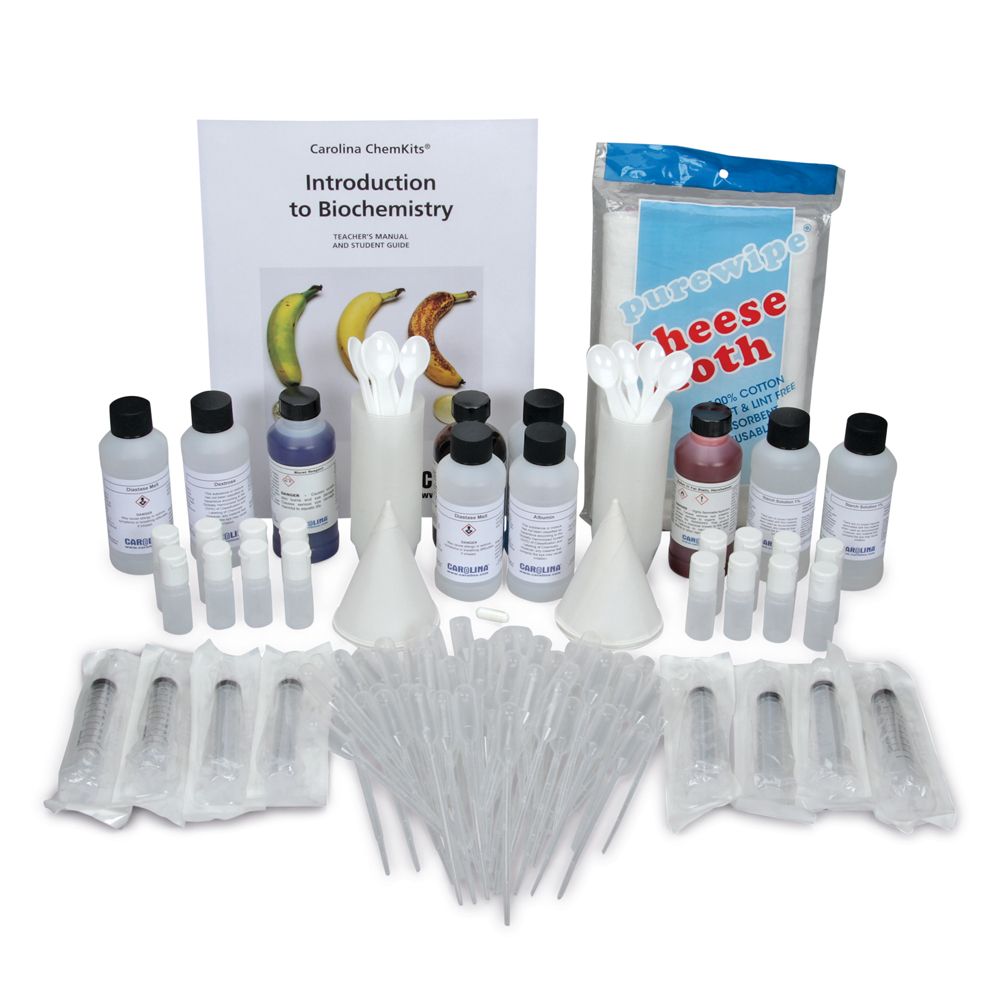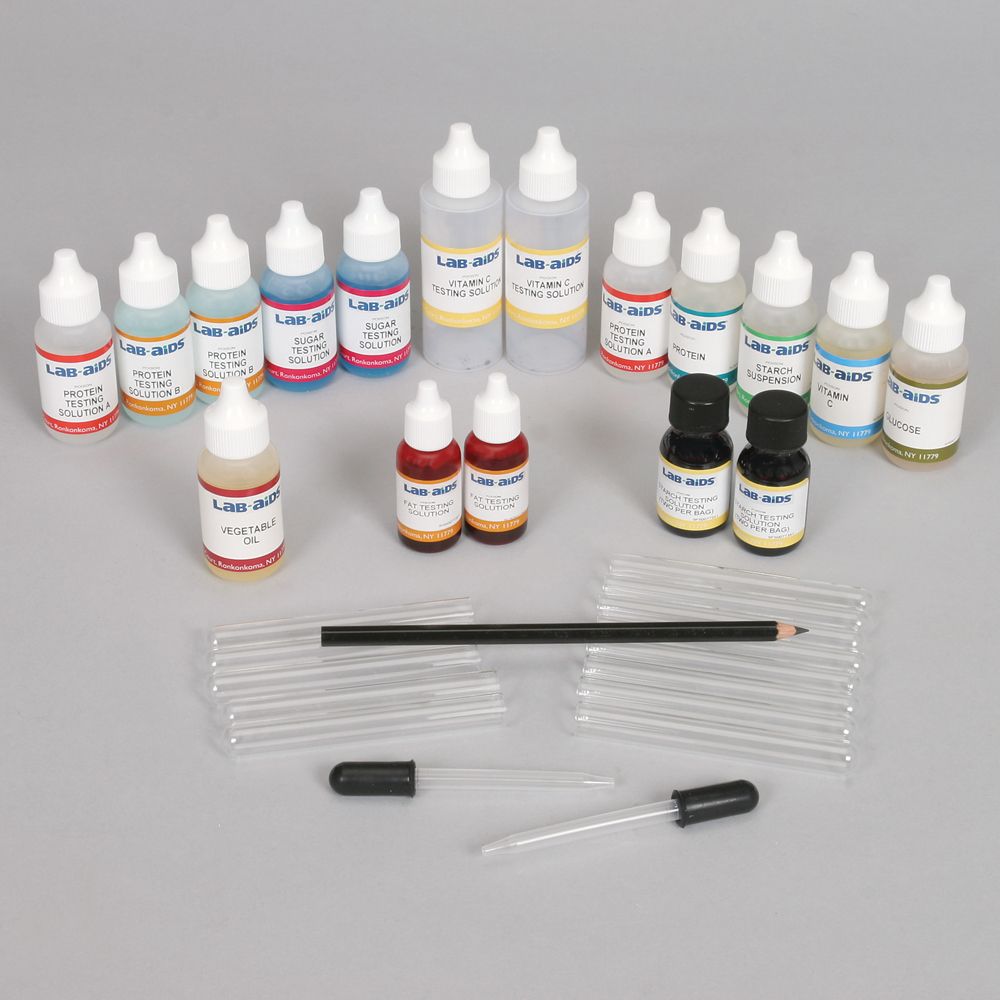Biochemistry is the foundation for all biology concepts. Basic elements combine into the macromolecules that make life processes possible. This guide breaks down the important information students need to know, provides links to products and free digital resources, and includes suggestions for hands-on labs that reinforce student learning. We’ve gathered a variety of products and resources to help you teach this concept. They include:
- Models and manipulatives to simplify teaching cell structure and function
- Biochemistry activities, experiments, and kits
- Free resources for you and your students
The major areas covered in this topic:
Macromolecules
Macromolecules are the building blocks for more complex biochemicals. A basic understanding of their structure and function is essential for understanding how life exists and is maintained.
Inquiries in Science®: Synthesizing Macromolecules Kit #251023
Intermediate
Easy to Perform Requires some background knowledge
Students investigate macromolecules through a series of activities. First, students model the formation of carbohydrates, lipids, nucleic acids, and proteins. Next, students perform tests for monosaccharides, starches, and proteins. Finally, students design and carry out an experiment to measure how environmental factors influence enzyme activity.
Carolina ChemKits®: Introduction to Biochemistry #841152
Intermediate
Easy to Perform Requires some background knowledge
Introduce students to the chemical processes within living organisms and perform some of the most common biochemical tests to identify those macromolecules. Students first perform qualitative tests to confirm the presence of starches, sugars, proteins, and lipids in both standard and sample solutions. They use their observations of these tests on the sample solutions of bananas at various stages of ripening and of diastase malt to then perform their own biochemical reaction and test the results.
Enzymes
Enzymes are highly specialized proteins that control the rates of reactions in organisms. They control the rate of metabolism by controlling the rates of lactose and glucose breakdown, for example. Understanding the role of enzymes shines a light on how organisms develop, grow, and maintain life functions.
Carolina ChemKits®: Introduction to Enzymes #841172
Intermediate
Easy to Perform Requires some background knowledge
Explore the biochemical function of enzymes with this 4-experiment kit. Students study pepsin, invertase, and amylase to understand their effects on the reactions they catalyze. Kit activities can be completed in 4 lab periods.
DNALC Making Lactose-Free Milk Kit #211337
Intermediate
Easy to Perform Requires some background knowledge
Many students are aware of lactose intolerance, but how many actually understand what it means and how it relates to human evolution? Help your students make that connection with this exclusive kit from Carolina and the DNA Learning Center. Students review the relationship between genes and proteins, learn about enzyme functionality, and explore the relationship between lactase and human evolution. In the core activity, students create a column with immobilized lactase enzyme beads to create lactose-free milk.
Exploring Enzymes and Evolution Through Lactose Intolerance Kit #202270
Intermediate
Easy to Perform Requires some background knowledge
This lab integrates topics including evolution, single nucleotide polymorphisms, geography, physiology, and the use of controls. Students test baby formula, milk, and other controls in the presence and absence of lactase, and measure the activity of the enzyme by using glucose test strips.
Carolina BioKits®: Enzymes and the Science of Cheesemaking #202306
Intermediate
Easy to Perform Requires some background knowledge
Give your students hands-on experience in the biology and chemistry of cheesemaking. Using the kit, they learn about the connection between enzymes, pH, and microbes and study their role in the cheesemaking process. Students then explore the use of microbial rennet to coagulate milk, and design and perform an experiment to study the conditions affecting coagulation.
Carolina BioKits®: Exploring with Pectinase: An Introduction to Enzymes #202316
Intermediate
Easy to Perform Requires some background knowledge
Introduce your students to enzymes and how temperature and concentration affect an enzyme’s ability to convert reactants into products. In this activity, students add increasing amounts of the enzyme pectinase to applesauce and observe how much juice is released at various temperatures.
Food Nutrients
Food nutrient analysis is a method for testing the components of a food sample. For an organism to thrive it must have the appropriate amount of all necessary types of nutrients. One way to determine this information is to perform chemical tests on a food sample to determine the composition of that food.
Food Nutrient Analysis Kit #202500
Beginning
Easy to Perform Requires little to no prior knowledge
Students perform qualitative tests for sugar, starch, lipid, protein, and vitamin C on standards and control samples. They then use these tests as evidence to support their identification of 2 unknown substances. Instructional material describes the function of these nutrients in the body, their importance, and how the qualitative tests work.
Carolina ChemKits®: Introduction to Properties of Lipids Kit #841131
Beginning
Easy to Perform Requires little to no prior knowledge
Lipids are organic compounds that provide the most efficient source of energy to living organisms. In the 1st part of the kit, students observe the interesting properties of lipids, including the famous grease spot test, solubility, Sudan stain test, soap synthesis, and emulsification. In the 2nd part, students digest lipids chemically and determine the necessary components for lipid digestion in the body.
Biochemistry Products
Choose from a variety of high-quality models to fit your needs. Check out our selection of prokaryotic, eukaryotic, plant, and animal models here.
Additional Biochemistry Support
We have free resources to help you teach this concept, including:
- Free Activities and Infographics
- How-to Videos
- Helpful Buying Guides
Free Biochemistry Resources
Carolina Essentials™ are free, hands-on, NGSS-based activities. These activities are designed to make implementing 3-D learning easy. Students make sense of phenomena while learning concepts essential for understanding ecosystem processes. You can browse all of these Carolina Essentials or try one of these:
Use these free resources to supplement your instruction about biochemistry.
Biochemistry Support Videos
Do your students need to brush up on their microscopy and slide preparation skills? These videos can help.
Buying Guides
Choosing the appropriate equipment for your labs can be a challenging task. Our buying guides are designed to make your decisions easy.
For More Guidance
These are our top picks. If you don’t see what you’re looking for, we’ll be happy to help you find the right activities and kits to simplify your planning and implementation. If you have questions, please contact us at product@carolina.com.
About The Author
Carolina Staff
Carolina is teamed with teachers and continually provides valuable resources–articles, activities, and how-to videos–to help teachers in their classroom.
















